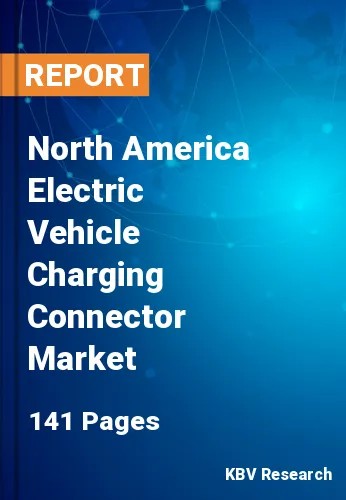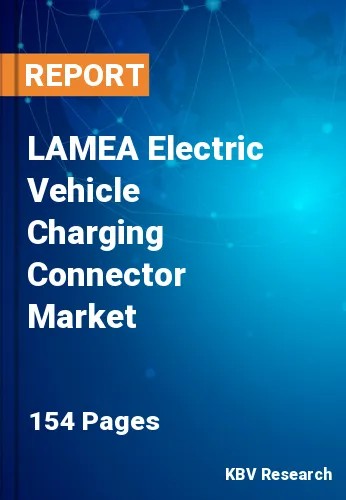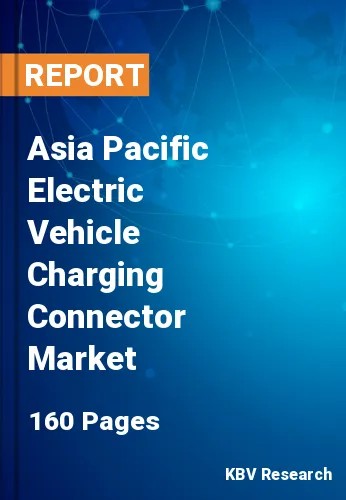The Worldwide Electric Vehicle Charging Connector Market is Projected to reach USD 181.2 Million by 2030, at a CAGR of 18.6%
Special Offering :
Industry Insights | Market Trends | Highest number of Tables | 24/7 Analyst Support
Electric Vehicle Charging Connector Market Growth, Trends and Report Highlights
According to a new report, published by KBV research, The Global Electric Vehicle Charging Connector Market size is expected to reach $181.2 million by 2030, rising at a market growth of 18.6% CAGR during the forecast period.
The Residential segment is leading the Global Electric Vehicle Charging Connector Market by End User in 2022; thereby, achieving a market value of $119.5 Million by 2030. The development of home chargers has attracted OEMs' increased attention, which is responsible for the segment's growth. Furthermore, individuals embracing electric vehicles due to a growing environmental concern will need EV charging stations in their residential neighborhoods. Residential charging connectors offer electric vehicle owners a dependable and easily accessible charging solution for daily usage by enabling them to charge their vehicles conveniently and safely at home.
The Fast segment is exhibiting a CAGR of 20.7% during (2023 - 2030). As it offers to charge via a 240 V AC socket and necessitates the installation of home charging or public charging equipment, the market is expanding. Fast charging is currently the norm at most public and commercial electric vehicle charging stations. Manufacturers of well-known rapid chargers include ClipperCreek, Changepoint, JuiceBox, and Siemens. In many regions, the demand for fast charging and rising EV sales will increase the need for EV charging connectors.
The CCS segment acquired maximum revenue share in the Global Electric Vehicle Charging Connector Market by Type in 2022; thereby, achieving a market value of $67.6 Million by 2030. To support DC fast charging, a type 2 charger has been adapted in CCS. This plug is used in all regions and at Ionity's charging infrastructure, which uses 350 kW chargers. Major automakers like Volkswagen, BMW, Ford, General Motors, and many more have adopted the combined charging system (CCS) as the industry standard charging technology. This widespread acceptance has contributed to CCS's rise to prominence as the industry's leading EV charging solution.
The Level 2 segment is showcasing a CAGR of 19.1% during (2023 - 2030). Level 2 charging involves the use of a 240-volt AC electrical supply to power an electric car. An EV battery may be charged much more quickly at Level 2 than at Level 1. Level 2 chargers can also provide up to 30 miles of range every hour of charging. The availability of level 2 charging stations is increasing, making finding one on the road simpler. Many public charging stations provide level 2 charging, and some businesses are installing level 2 charging stations in their office parking lots.
The Asia Pacific region dominated the Global Electric Vehicle Charging Connector Market by Region in 2022, and would continue to be a dominant market till 2030; thereby, achieving a market value of $73.9 Million by 2030. The Europe region is estimated to grow at a CAGR of 18.1% during (2023 - 2030). Additionally, The North America region would register a CAGR of 18.3% during (2023 - 2030).
Full Report: https://www.kbvresearch.com/electric-vehicle-charging-connector-market/
The market research report has exhaustive quantitative insights providing a clear picture of the market potential in various segments across the globe with country wise analysis in each discussed region. The key impacting factors of the market have been discussed in the report with the elaborated company profiles of Sumitomo Electric Industries, Ltd., Siemens AG, Schneider Electric SE, Robert Bosch GmbH, TE Connectivity Ltd., Yazaki Corporation, HUBER+SUHNER AG, ITT, Inc., Amphenol Corporation, Tesla, Inc.
Global Electric Vehicle Charging Connector Market Segmentation
By End User
- Residential
- Commercial
By Type
- CCS
- Chademo
- GB/T
- Others
By Charging Speed
- Slow
- Fast
By Charging Level
- Level 3
- Level 2
- Level 1
By Geography
- North America
- US
- Canada
- Mexico
- Rest of North America
- Europe
- Germany
- UK
- France
- Russia
- Netherlands
- Norway
- Rest of Europe
- Asia Pacific
- China
- Japan
- India
- South Korea
- Singapore
- Taiwan
- Rest of Asia Pacific
- LAMEA
- Brazil
- Argentina
- UAE
- Saudi Arabia
- South Africa
- Nigeria
- Rest of LAMEA
Companies Profiled
- Sumitomo Electric Industries, Ltd.
- Siemens AG
- Schneider Electric SE
- Robert Bosch GmbH
- TE Connectivity Ltd.
- Yazaki Corporation
- HUBER+SUHNER AG
- ITT, Inc.
- Amphenol Corporation
- Tesla, Inc.
Related Reports:



